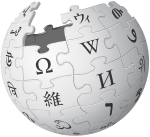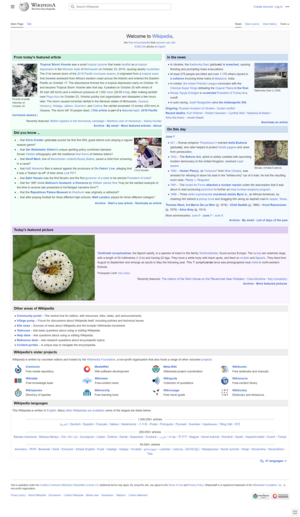Wikipedia
 The , a globe featuring glyphs from several writing systems
|
|
|
Type of site
|
Internet encyclopedia |
|---|---|
| Available in | 295 languages |
| Owner | |
| Created by | Jimmy Wales, Larry Sanger |
| Slogan(s) | The free encyclopedia that anyone can edit |
| Website | |
| Alexa rank |
|
| Commercial | No |
| Registration | Optional |
| Users | >294,951 active users and >66,256,618 registered users |
| Launched | January 15, 2001 |
| Current status | Active |
|
Content license
|
CC Attribution / Share-Alike 3.0 Most text is also dual-licensed under GFDL; media licensing varies |
| Written in | LAMP platform |
| OCLC number | 52075003 |
|
|
 |
|
|
|
|
|
In 2003, economics PhD student Andrea Ciffolilli argued that the low transaction costs of participating in a create a catalyst for collaborative development, and that features such as allowing easy access to past versions of a page favor "creative construction" over "creative destruction".
Editors in good standing in the community can run for one of many levels of volunteer stewardship: this begins with "administrator", privileged users who can delete pages, prevent articles from being changed in case of vandalism or editorial disputes, and try to prevent certain persons from editing. Despite the name, administrators are not supposed to enjoy any special privilege in decision-making; instead, their powers are mostly limited to making edits that have project-wide effects and thus are disallowed to ordinary editors, and to implement restrictions intended to prevent certain persons from making disruptive edits (such as vandalism).
Bureaucrats name new administrators, solely upon the recommendations from the community.
Distribution of the 43,458,311 articles in different language editions (as of 27 January 2017)
The unit for the numbers in bars is articles.
Though the various language editions are held to global policies such as "neutral point of view", they diverge on some points of policy and practice, most notably on whether images that are not licensed freely may be used under a claim of fair use.
Translated articles represent only a small portion of articles in most editions, in part because fully automated translation of articles is disallowed. Articles available in more than one language may offer "", which link to the counterpart articles in other editions.
A 2008 study conducted by researchers at Carnegie Mellon University and Palo Alto Research Center gave a distribution of topics as well as growth (from July 2006 to January 2008) in each field:
A 2011 study conducted by researchers at the University of Minnesota indicated that male and female editors focus on different coverage topics. There was a greater concentration of females in the People and Arts category, while males focus more on Geography and Science.
Research conducted by Mark Graham of the Oxford Internet Institute in 2009 indicated that the geographic distribution of article topics is highly uneven. Africa is most underrepresented.
...
Wikipedia

